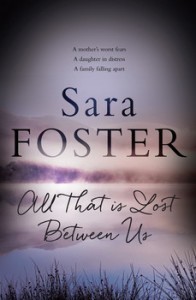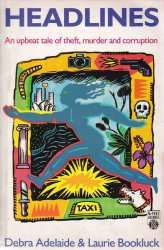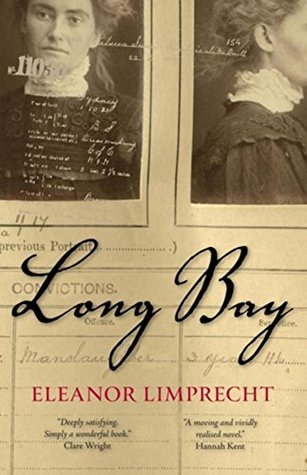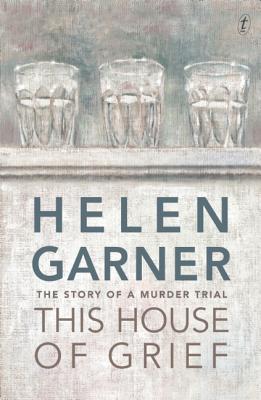The crime fiction and true crime genre has attracted 45 reviews or discussions since the first of January with a total of 33 distinct books by 24 different authors being discussed, making this ‘our’ best start to an AWW challenge.
 The most popular book is Sara Foster’s 2016 release ALL THAT IS LOST BETWEEN US which is the subject of 4 reviews and an interview with the author. It tells the story of the Turner family and a secret that has the potential to tear them apart. At the heart of the book are Anya, a school counsellor, and her daughter Georgia who is troubled by something she knows. Veronica, who posts her reviews at Good Reads, says of the book
The most popular book is Sara Foster’s 2016 release ALL THAT IS LOST BETWEEN US which is the subject of 4 reviews and an interview with the author. It tells the story of the Turner family and a secret that has the potential to tear them apart. At the heart of the book are Anya, a school counsellor, and her daughter Georgia who is troubled by something she knows. Veronica, who posts her reviews at Good Reads, says of the book
Foster has captured relationships with such expertise and those interminable years between child and adult. The feelings of a mother of a teen, sometimes being too scared to say anything because it may be the wrong thing and feeling shut out. Also the crumbling relationship between husband and wife due to the slow breakdown of communication.
Brenda, who also posts at Good Reads, summed up her feelings with these words
All That Is Lost Between Us is a brilliant psychological thriller by Aussie author Sara Foster. Filled with gripping suspense, the tension kept me turning the pages quickly, especially during the second half of the book.
In her interview with the author Deborah at Debbish started out by asking Sara about the inspiration for the strong female characters found in her work
I’m inspired by many different types of women – those who do a fantastic job of looking after their families, those with difficult professions, or who cope amazingly in traumatic circumstances, and those who diligently pursue their passions. I find something inspiring in most women I know, as well as other writers and public figures.
The interview goes on to discuss the subject of motherhood which is at the centre of ALL THAT IS LOST BETWEEN US.
♦ ♦ ♦ ♦ ♦ ♦ ♦
 A highlight for the challenge so far this year is an overview of Sulari Gentill’s historical fiction series of mysteries set in 1930’s NSW (and occasionally beyond) by Karen Chisholm at Newton Review of Books which opens strongly
A highlight for the challenge so far this year is an overview of Sulari Gentill’s historical fiction series of mysteries set in 1930’s NSW (and occasionally beyond) by Karen Chisholm at Newton Review of Books which opens strongly
Sulari Gentill’s award-winning historical crime series is written with verve and spirit, the fiction woven seamlessly into actual events of the time.
The essay goes on to enumerate the many strengths of this excellent series which currently stands at seven novels to feature Rowland Sinclair, an artist from a wealthy family, his three staunch friends and Rowly’s extended, and sometimes exasperated family. I’m particularly glad to see the series’ humour being highlighted as that is one of the things I like most (though I must confess there is nothing I don’t like about this particular series). If you are keen to get started there are discount coupons available at the bottom of the essay. You’d buy them for the gorgeous covers alone wouldn’t you?
♦ ♦ ♦ ♦ ♦ ♦ ♦
I finally got around to reading Helen Garner’s THIS HOUSE OF GRIEF which I had been putting off because I’m a wuss about true crime. The book depicts Garner’s observations of the court cases in which Robert Farquharson was tried (twice) for the murder of his three young children in 2005 and I found it sad yet oddly, because it does not really answer all the questions you might think it should, satisfying. It is several weeks since I finished reading the book but I’m still reflecting on it and discussing it with anyone who will listen. I finished my review with these thoughts
Although it teases out explanations for Farquharson’s actions THIS HOUSE OF GRIEF does not pretend to speak to the broader social issue of this category of crime. This fact has made some readers cross but, even though it was partly what I was looking for going in, I’m not one of them. If I only judge the book that was written rather than the one I wanted to read then it is outstanding. As a glimpse into the modern justice system the book left me with more questions than answers. Is it enough that courtrooms provide a stage on which character can be demonstrated and subsequently judged? And if not…what else is there?
♦ ♦ ♦ ♦ ♦ ♦ ♦
 I was intrigued to see HEADLINES, a 1993 title by Debra Adelaide and Laurie Bookluck, turn up in this year’s first crop of reviews. The book’s subtitle calls it An upbeat tale of theft, murder and corruption which seems to nicely sum up the story surrounding the theft of an Aboriginal skull from a museum, the murder of a guard and the investigation of these crimes by a policewoman whose friend is accused of them. In her review at Good Reads catsalive says
I was intrigued to see HEADLINES, a 1993 title by Debra Adelaide and Laurie Bookluck, turn up in this year’s first crop of reviews. The book’s subtitle calls it An upbeat tale of theft, murder and corruption which seems to nicely sum up the story surrounding the theft of an Aboriginal skull from a museum, the murder of a guard and the investigation of these crimes by a policewoman whose friend is accused of them. In her review at Good Reads catsalive says
Despite the serious nature of the content, I found the story amusing, as was intended, & I thoroughly enjoyed it – which I didn’t think I would as the content is so grimy & corrupt at times. DS Tathra & Detective Constable Pat “Shirley” Temple are likeable, and the supporting characters are entertaining too. The nasty people are truly nasty & deserve their comeuppance – no ambiguity here. This is not a deep & meaningful treatise – although I think it would still resonate outside Australia & 23 years on -, but to divert & engage. It did that for me, at any rate.
♦ ♦ ♦ ♦ ♦ ♦ ♦
 A final review that caught my eye this time round was Jennifer Cameron-Smith’s discussion of Eleanor Limprecht’s novel LONG BAY which has, at its core, the real life story of Rebecca Sinclair who was convicted of manslaughter in 1909 when a woman died at her house after a botched abortion. Sinclair gave birth to her own child while imprisoned. Jennifer writes
A final review that caught my eye this time round was Jennifer Cameron-Smith’s discussion of Eleanor Limprecht’s novel LONG BAY which has, at its core, the real life story of Rebecca Sinclair who was convicted of manslaughter in 1909 when a woman died at her house after a botched abortion. Sinclair gave birth to her own child while imprisoned. Jennifer writes
Some novelizations of true stories do not work, sometimes the facts constrain the story. That wasn’t the case for me in this novel. I thought that Ms Limprecht imagined Rebecca’s life and challenges well. From the hardship faced by her mother, widowed with six children, to the role played by those willing to undertake abortions and the risks faced by those who underwent them, the story rang true for me. Perhaps Rebecca should have made different choices, certainly she seemed naïve and gullible at times. But what other options did she have?
I’m definitely heading off to my library for a copy of this one.
♦ ♦ ♦ ♦ ♦ ♦ ♦
Don’t forget you can sign up yourself to participate in the Australian Women Writers challenge and if this roundup hasn’t provided you with enough inspiration you can always browse the Challenge’s database of reviews.
♦ ♦ ♦ ♦ ♦ ♦ ♦
About Me
I’m Bernadette Bean. I’ve been reading avidly for as long as I can remember, blathering about the subject since late 2008 at Reactions to Reading, am co-host of Fair Dinkum Crime, a site devoted to promoting and discussing Australian crime fiction, and have twice been a judge for a national crime fiction award.







Trackbacks/Pingbacks